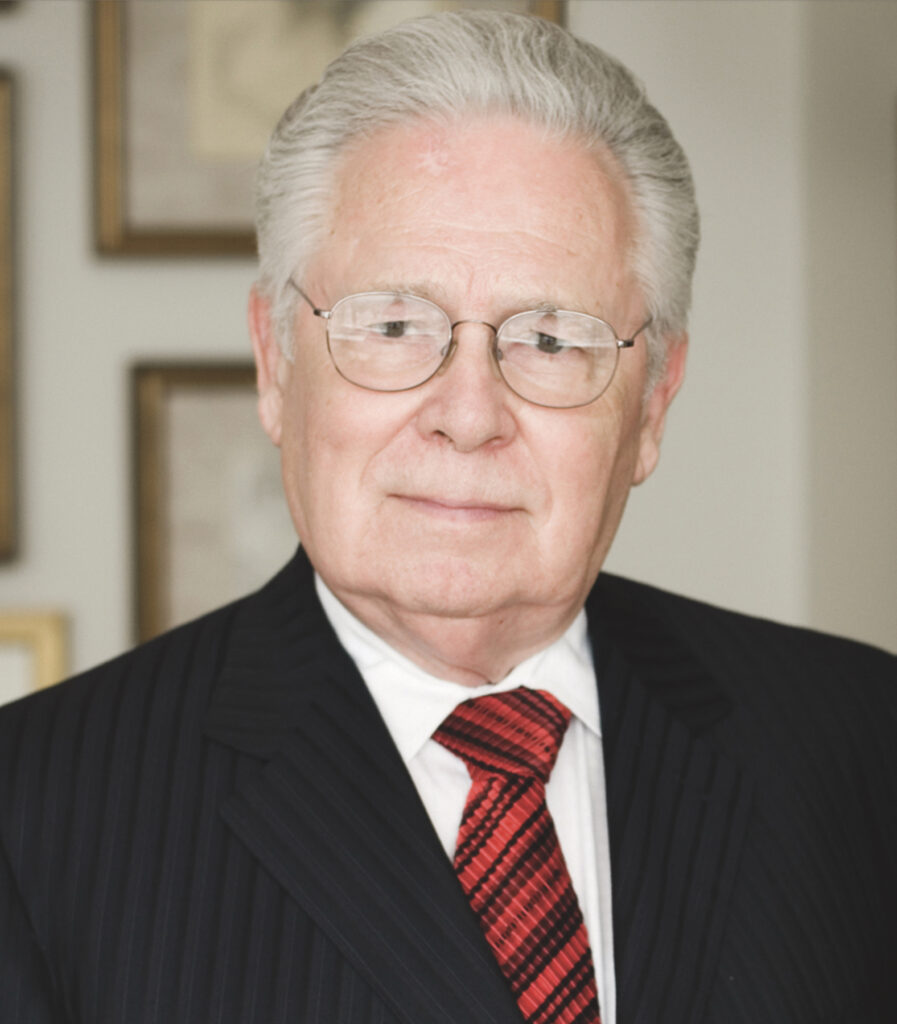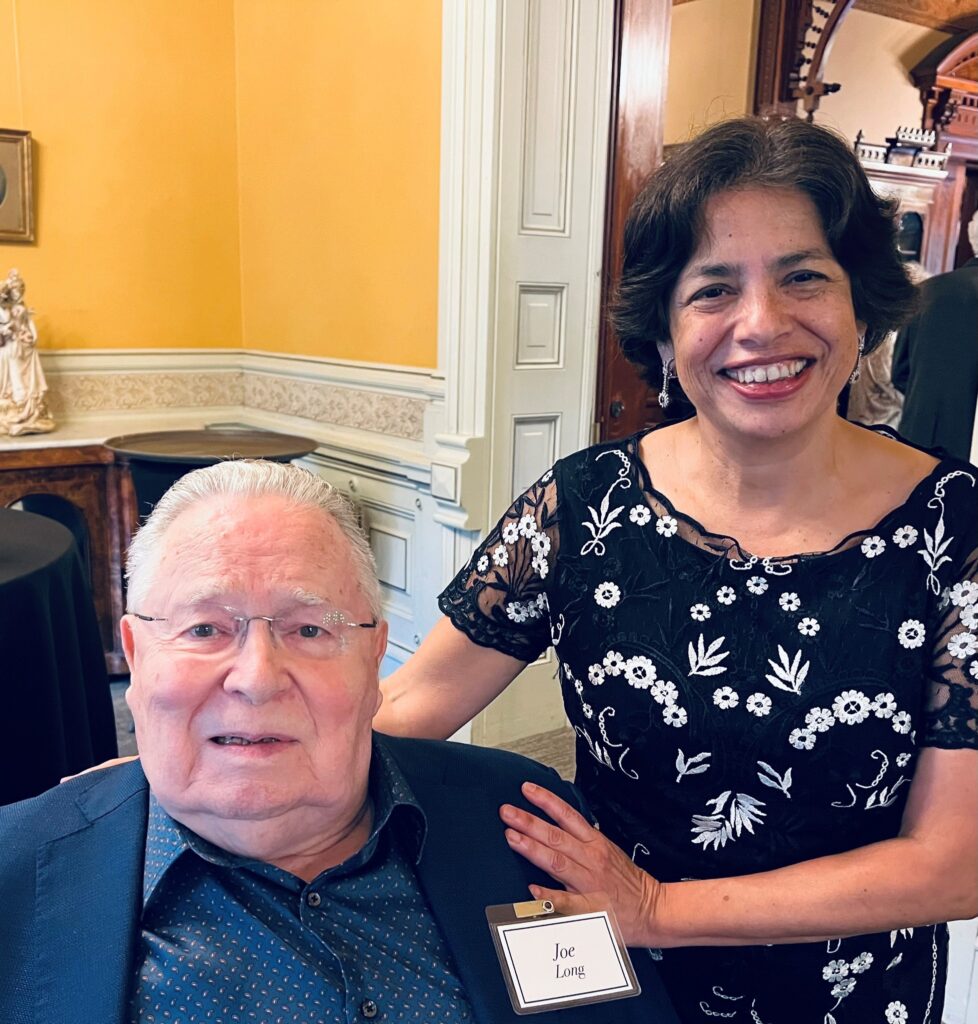WIDELY RECOGNIZED as a transformational business leader and lawyer, Joe R. Long has led a stellar career, from earning his undergraduate and JD degrees at UT Austin, right through becoming Chairman and CEO of First State Bank. The name Long is to be found throughout Austin as a testament to his generosity and that of his late wife, Dr. Teresa Lozano Long, lovingly known as Terry. Their contributions to UT and the entire University of Texas System, as well as to the City of Austin and the State of Texas, cannot be overestimated. Both Terry and Joe were visionaries and ardent supporters of education, medicine, and the arts. For his significant contributions to UT, Joe has received numerous recognitions, including the Distinguished Alumnus Award and the Presidential Citation Award. In 2018, he and Terry were the recipients of the Santa Rita Award for public service and philanthropy, which is the highest honor bestowed by the UT System Board of Regents.
Shortly before the turn of the millennium, UT Austin President Larry Faulkner made Latin American Studies a top priority of his administration, declaring that UT “should become the nation’s most important source of expertise on Latin America.” Joe Long heard Faulkner loud and clear, and, in 2000, pledged $10 million to the Institute of Latin American Studies. As a tribute to his beloved Terry, LLILAS became her namesake. The Longs’s generosity has been instrumental for LLILAS to achieve new heights, and the Long endowment has opened a multitude of doors for students, researchers, and faculty.
The following interview took place one afternoon in Joe’s residence. Joe did not talk about his own career accomplishments. He preferred to share with me childhood and youth memories, and some thoughts on his decision to make the transformative gift that created LLILAS.
Adela Pineda Franco
Lozano Long Professor of Literary and Cultural Studies
Director, Teresa Lozano Long Institute of Latin American Studies
Adela Pineda Franco: Where were you born and what was your childhood like?

Joe R. Long: I was born in San Antonio but my family moved from there before I was a year old. My father was an electrician. His district covered quite a large area, stretching from Kirby to Sonora, Texas. There were three oil-pumping stations in that district, part of a pipeline that went quite a distance. My father was responsible for the maintenance of the electrical equipment in those three stations, and for connecting electric lines between them. When I was five-and-a-half years old, he climbed a pole to work on the lines; his right leg gave way while getting down. He fell about 25 feet and landed on his back on a pile of rocks. He had a testing kit around his neck that made him fall head first. He broke his back in three places. This event pretty much defined our lives for the next ten years. Early on, if my father stepped the wrong way, it would set off spasms that caused him terrible pain. The only way that he could be relieved was with a hypodermic needle. It was a terrible time in our lives. We couldn’t always get a doctor to give him his shots immediately, because the doctors there served a wide area. The doctor might be at the other end of the county birthing a baby and couldn’t leave until the baby came. As time went on, my father slowly got better. He could drive a car and ride a horse and do a lot of other things that he thought he would never be able to do again. He always refused to give in to the injury. After six or seven years, we moved back to East Texas, where my parents were from. My father started a farming and cattle business on the farm that his family owned. One night, there was a cow with horns running down the fence. My brother, who was about four years old, was there along the fence somewhere. Dad sprang out and threw the cow to the ground to save my brother, and he managed to rebreak his back. This time, the doctor told him, “If you don’t do what I tell you this time, you are going to be paralyzed for the rest of your life.” And what he told him was to go lie in bed for a year and let his back heal.
APF: Our parents have a huge influence in our lives. Your father was a resilient person with determination and grit. How about your mother?
JRL: She had to go back to work as a teacher to make a living for the family. She had a year of college and three summers. Back then, if you were working on a degree, you could teach without it. So she taught school and, on Saturdays, she went to college. She and I got our college degrees at about the same time.
APF: What did you study?
JRL: I majored in government and minored in U.S. history. I got around to teaching school after having gone to college, which was difficult because my father couldn’t help much, my mother was working without having earned her degree, making $90 a month. We had a garden and a cow, which I milked. We had plenty to eat, but our life was not easy. I went to a junior college, Tarleton. It is a senior college now. I went there because it was cheap. My mother had told me, “Son, I can give you $25 a month if you can make the rest, that way you can go to college. If not, you can go to work.” I went to college and worked. She sent me $25 a month and I managed.
Time passed, I got out of college, and I had to serve in the military. [Long earned his bachelor’s degree from UT Austin in 1951.] I got out of the service, and went to teach school for a year. That’s when I met Terry. She was a physical education teacher and we met in Alice, Texas. She was from Premont, about 20 miles south of Alice. I was teaching government and history. When I met Terry, I became interested in the Mexican American community.

APF: And then you went to law school at UT?
JRL: Yes, because I was qualified by the G.I. Bill, but I still had to work. I decided that I couldn’t make a living for a family with teaching.
APF: Terry was pursuing her doctoral degree in education at the time?
JRL: Yes. She had a hard time. The chairman of her department, who was on her committee, gave her a really rough time. I think he was determined that she would not get her doctoral degree. I think that he didn’t think a Mexican woman had any business getting a doctoral degree.
APF: She must have been very intelligent and strong willed because, at the time, not many women could get a doctoral degree.
JRL: That’s right. The administration at UT at the time was actually prejudiced against women in general, and particularly Mexican women, getting doctoral degrees.
APF: After law school, did you work as a lawyer, or did you do something different?
JRL: I worked as a lawyer. My practice was in administrative law, principally with banks, savings and loans, and insurance companies. I specialized in what they called an administrative role because all three of those industries are governed by an agency that makes them more responsive to their own history. At the time, Terry worked for the State Department of Education and also for the U.S. Department of Education as a special consultant. She had a rather interesting job, I thought. She traveled around all of the United States, working on the effect of the migration of Hispanics from Texas up through the rest of the country. She would go to these different areas where migration had occurred and study the effects of government programs [for migrants].
APF: What other aspects of the Hispanic and Mexican culture did you discover when you met Terry?
JRL: I learned a lot. For one thing, I learned how prejudiced my father and his family were about Mexican culture and Mexican American people, and how little they knew. Prejudices are the result of our not knowing much about the other culture.
APF: I didn’t meet Terry. What do we need to remember about this amazing woman?
JRL: She was heart and soul a Mexican. She was always looking for ways that Mexicans could better themselves. She thought that the road to that in the United States was education. She spent her whole life trying to support people of Mexican heritage.
APF: Could you tell me about your decision to endow the institute? How did that happen? What benefits do you see in having a strong center for Latin American Studies in Texas?
JRL: Well, it seemed to me that there was a need for a school that would make the United States more aware of Latin America’s history and culture, so that we could further our diplomatic ties with the countries south of the Rio Grande. I also thought that the Institute would help empower students of Latin American descent in the United States. Education should bring us closer together. There are problems that affect Latin America and the United States. Water scarcity, for instance, will be a challenge for both northern Mexico and southern U.S. The way to tackle this challenge is by working together, because what affects one region also affects the other. It’s not a problem that lends itself to a separation. We need to think as a more united front. ✹
